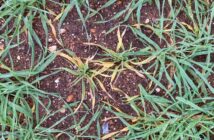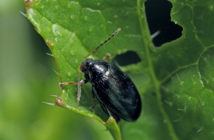The government must ensure that any new domestic agricultural policy looks for solutions to make growing oilseed rape viable for the future, says the NFU.
The union’s call follows the publication of its latest Harvest Survey results which show significant drops in oilseed rape yield. While highlighting high yields across the arable sector this year for cereal crops, the survey revealed that major threats from cabbage stem flea beetle have seen oilseed rape yields drop to 3.4 tonnes per hectare, below the five-year average of 3.6 tonnes per hectare.
This prompted a sharp reminder to policy-makers that with no access to effective plant protection products, farmers are reducing the area of oilseed rape they are growing.
“Despite a challenging growing season, the UK arable sector has shown strong physical resilience and our sector crucially needs this to be converted into long-term business resilience,” said NFU combinable crops board chairman, Tom Bradshaw (pictured above).
“The glaring result from this survey is the significant drops in oilseed rape yield, however, which can almost certainly be attributed to the loss of effective plant protection products to control pest pressure. I have heard from countless farmers that they are questioning whether it is worth growing the crop as a result. It just demonstrates how crucial it is to have an agricultural policy that gives farmers confidence to grow these crops, not the opposite.
“Oilseed rape is a vital crop for the arable sector. It is crucial to a broad rotation and has huge demand across a wide range of products including food, cosmetics, plastics, energy and animal feed. This demand will not fall away. But if farmers stop growing this crop, we will simply become more reliant on imports of oilseed rape and other oil crops, either produced with products that farmers do not have access to in this country or being produced with a huge environmental impact. We will be severely undermining our farmers and the British arable sector, as a result.
“That’s why we need to see future plant health strategy that allows farmers and growers to harness innovation and provide growers with solutions to run sustainable businesses, while ensuring needs of the public and the environment are met. We firmly believe that enhancing and protecting the environment goes hand-in-hand with food production, and it is crucial that farmers have access to all the tools in the toolbox to provide safe, traceable and affordable food for all.”




